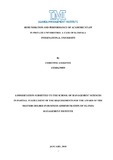Remuneration and Performance of Academic Staff in Private Universities: A case of Kampala International University
Abstract
The study investigated the relationship between remuneration and performance of academic staff
of private universities: a case of Kampala International University. The general purpose of the
study was to investigate the relationship between remuneration and performance of academic
staff of Kampala International University. The study examined salary, pay incentives and benefit
packages as the independent variables while performance was the dependent variable. Salary was
examined using two dimensions of pay structures and pay systems. Pay incentives had three
dimensions which included: allowances, bonuses and wages. Benefit packages had three
dimensions: tuition fees assistance, gratuity and health insurance. Performance had three
dimensions of quality of reports made, compliance with academic standards and innovation in
academic output.
The study looked at salary, pay incentives and benefit packages and how they affect performance
of academic staff of KIU. The case study design using both qualitative and quantitative
techniques was used to collect the data. The study population included principals of colleges,
heads of department, quality assurance staff, human resource department staff and lecturers. Data
collection was done using self administered questionnaires and interviews. The questionnaire
was designed with statements that required respondents to state their views of either agreement
or disagreement using a five point Likert scale ranging from strongly disagree to strongly agree.
The interview guide was used to have a direct interaction with the respondents to probe and get
indepth information about the variable understudy in KIU. For purpose of analyzing quantitative
data, descriptive statistics (frequencies and percentages) was used to determine the distribution
of the respondents on personal information and on the questions under each of the variables.
Inferential statistics (correlation coefficient of determination and regression) were used to test the
hypotheses. Qualitative data was analyzed using content analysis. Specifically the study findings
revealed that there is a positive significant relationship between salary and performance (rho =
.630, p=.000). There is a positive significant relationship between pay incentives and
xiii
performance (rho = .622, p=.000) It was further revealed that there is a positive significant
relationship between work benefits and performance (rho = .727, p=.000). It was concluded that
salary pay structure based on skills and competencies as well as salary payment to staff based on
roles and responsibilities lead to improved employee performance. In addition, to that monitory
incentives have a great effect on employee performance and work benefit packages motivate
staff members to improve performance. The study revealed discontentment among the academic
staff regarding the salary, inadequate pay incentives and work benefit packages compared to
their qualifications and efforts. It was therefore recommended that management at KIU should
increase staff salary within the existing payment structures. There should be a uniform salary
increment made across all salary scales, allowances and wages which staff members receive per
extra hour worked be increased. Furthermore, the university should provide health insurance
benefits to all academic staff members in order to improve overall performance.

